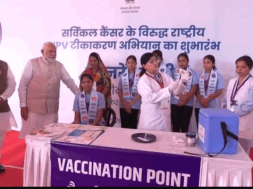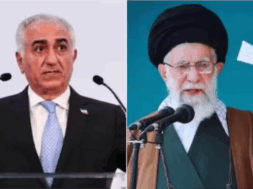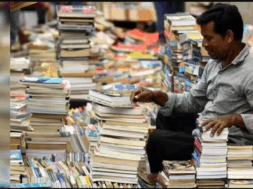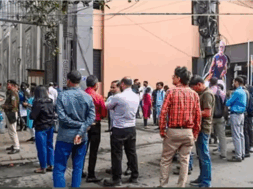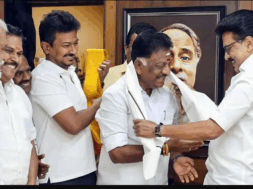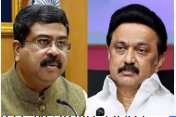
Manas Dasgupta
NEW DELHI, Feb 21: The DMK Government in Tamil Nadu seems to be preparing for a “language war” against the BJP-led NDA government at the centre with the union education minister Dharmendra Pradhan indirectly threatening the state of stopping educational aids if it continue to refuse to implement the three language formula under the National Education Policy (NEP) 2020 and the state viewing it as a move to impose Hindi on the unwilling state.
Mr Pradhan has written to Tamil Nadu Chief Minister MK Stalin, urging the state to reconsider its opposition to the NEP 2020 stating that the policy was designed to be flexible and should not be viewed through a political lens. He said, “NEP 2020 is not just a reform—it is a transformative vision that seeks to elevate India’s education system to global standards while preserving and strengthening our linguistic and cultural diversity.”
Escalating the political row between the Centre and Tamil Nadu over the NEP 2020, Mr Pradhan wrote to Mr Stalin on Friday stating that it was “inappropriate for the State to view NEP 2020 with a myopic vision and spin progressive education reforms into threats to sustain their political narratives.”
Tamil Nadu has been one of the strongest critics of NEP 2020, particularly opposing the three-language formula. Addressing this concern, Pradhan assured that there was “no question of imposing any language upon any state or community,” reiterating that linguistic freedom remains a core principle of the policy.
In his letter to Stalin on Friday, Pradhan wrote: “Tamil Nadu has always been a torchbearer of social and educational progress, pioneering some of the most transformative reforms in India…however, the continued opposition to the NEP 2020 for political reasons deprives students, teachers, and educational institutions in Tamil Nadu of the immense opportunities and resources that this policy offers. The policy is designed to be flexible, allowing states to customize its implementation to suit their unique educational needs.”
The minister highlighted the Centre’s efforts to promote Tamil language and culture, citing initiatives such as Kashi Tamil Sangamam and Saurashtra Tamil Sangamam. He noted that “Tamil language is eternal, and Tamil culture is global,” quoting Prime Minister Narendra Modi’s remarks from his 2022 visit to Chennai.
Pradhan also pointed out that several translations of Thirukkural have been released in multiple Indian languages, and AI-based translation tools like Anuvadini and Bhashini have been developed to facilitate the learning of regional languages. He argued that Tamil Nadu’s continued opposition to NEP is depriving students of the opportunities the policy offers.
“The continued opposition to NEP 2020 for political reasons deprives students, teachers, and educational institutions in Tamil Nadu of the immense opportunities and resources that this policy offers,” he wrote. Calling on the Tamil Nadu government to reconsider its stance, Pradhan stated, “I would, therefore, request you to rise above political differences and look into the matter holistically, keeping in mind the interest of our young learners.”
The letter comes amidst ongoing tensions between the Centre and Tamil Nadu over education policies, particularly regarding the state’s demand for a separate education framework. Stalin had earlier written to the Prime Minister expressing strong objections to NEP 2020, maintaining that it went against the state’s interests.
In his letter to the Prime Minister, Stalin called the linking of Samagra Shiksha Abhiyan and PM SHRI Schools with the National Education Policy “fundamentally unacceptable.” However, Pradhan asserted that centrally-supported schemes like SSA are aligned with NEP 2020, while PM SHRI schools have been designed as ‘NEP exemplar schools.’
Pradhan said that NEP is designed to accommodate regional needs and that several non-BJP states have implemented its progressive policies despite political differences. “NEP 2020 aims to broaden the horizon, not narrow them,” he said.
Mr Stalin had earlier accused Mr Pradhan of “blackmailing” the state by withholding funds for not accepting the National Education Policy (NEP) 2020. In a post on X, Stalin shared a video of Pradhan speaking to reporters in Varanasi, where he said that Tamil Nadu must follow the Constitution and implement the three-language policy.
Reacting to this, Stalin questioned, “Can the Education Minister cite any section of the Indian Constitution that makes the three-language policy mandatory? Education is on the concurrent list, and the Union government does not have a monopoly over it. Tamil Nadu will not tolerate such blackmail.” Deputy Chief Minister Udhayanidhi Stalin also criticised Pradhan’s remarks, calling the threat to withhold funds “unacceptable” and said the state was ready for another “language war” with the centre.
He also reminded the BJP that “this is a Dravidian land… the land of Periyar” and said, “The last time you tried to take away the rights of the Tamil people, they started ‘GoBackModi’. If you try again… this time the voice will be ‘Get out, Modi’… agitation will be done to send you back.”
Mr Pradhan’s letter is the latest in the ‘language war’ brewing between the southern state and the centre over the ‘imposition of Hindi’ – a new flashpoint over a longstanding and sensitive issue. With Tamil Nadu refusing to budge from its stance against the NEP, the Centre has not released funds to the state under Samagra Shiksha, a school education programme.
On Thursday, Stalin wrote to Prime Minister Narendra Modi seeking his intervention to ensure the release of Samagra Shiksha funds worth Rs 2,152 crore to the state, without linking it to the implementation of NEP 2020. He wrote that Pradhan’s remarks “indicating that Samagra Shiksha funds for Tamil Nadu would not be released until the State implements NEP 2020 in its entirety and adopts the three-language policy” has “created immense anxiety and unrest” among students and the public in the state. He also complained about Dharmendra Pradhan warning the state to comply with the NEP’s three-language policy or forfeit release of education sector-related funds from the centre.
In his letter – which Mr Pradhan has declared “was not written in good taste”, was “full of political motivation”, and had “imaginary concerns” – Mr Stalin urged the Prime Minister to release Rs 2,154 crore in funds for 2024/25 in the spirit of “cooperative federalism” and for the “welfare” of students.
Mr Stalin – who on Sunday said Mr Pradhan was trying to “blackmail” the state into submitting to ‘Hindi imposition’ by stopping transfer of funds – also insisted his government would not abandon the two-language formula followed by state-run schools since 1967 for the NEP’s three-language formula.
Historically, Tamil Nadu and the other southern states have been suspicious of the centre of trying to impose Hindi over regional languages; the stand-off led to riots in the 1930s and 1960s.
Tamil Nadu follows a two-language policy, i.e., it primarily teaches Tamil and English in state-run schools. This, state Education Minister Anbil Mahesh Poyyamozhi said allowed students to connect with their linguistic heritage, and, by learning English, also be able to interface globally.
“Since 1967 Tamil Nadu has had this two-language policy and Tamil and English is more than enough for us. We have already achieved a lot,” he said, pointing to the state’s track record in training high-achievers in STEM, or science, technology, engineering, and mathematics.
But the Education Policy of 2020 proposes a three-language policy, one of which is Hindi, and the Tamil Nadu government has declared this to be an attempt to impose the language. The BJP, meanwhile, has stepped up its three-language push in the state, which will vote in an Assembly election next year. The saffron party will launch a campaign from March 1.
The BJP’s push has been seen as part of its ongoing scramble for a foothold in the Tamil political landscape. The party has historically never managed to win over Tamil voters. In 2016 it contested all 234 seats but won zero. It set its sights lower in 2021, contesting just 20, but managing to win four. Its Lok Sabha poll record is worse – zero seats in the 2019 and 2024 polls.
Ahead of the launch and the 2026 poll, BJP state chief, K Annamalai, has also hit out at the DMK, accusing it of sticking to an “outdated” policy from the 1960s. “The world is developing rapidly. And what is the point of imposing your outdated policy of the 1960s on the children of Tamil Nadu?” he said.

